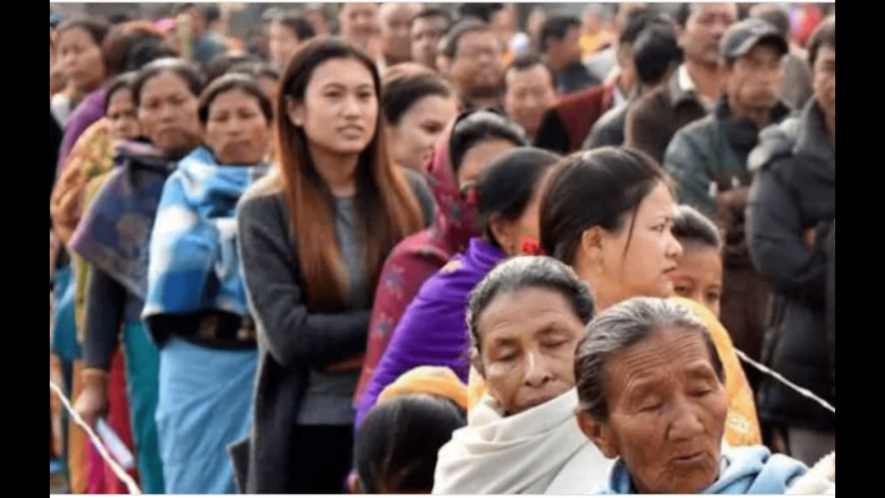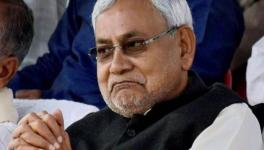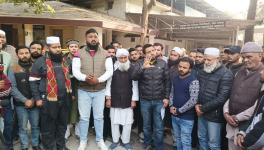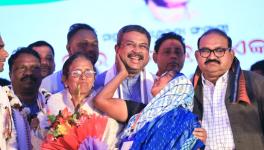Nagaland Elections: All Eyes on Clean Election Movement’s Impact on Outcome

Representational Image. Image Courtesy: PTI
Kolkata: It appears that the February 27 Nagaland Assembly election results will be as much a verdict on political parties as on the qualitative change brought about by the ongoing Clean Election Movement (CEM), if opinions expressed by a cross-section of political watchers are anything to go by.
Last December marked the start of the year-long celebration of the arrival of 150 years of Christianity in Nagaland, which has a 60-member Assembly. Almost 9 out of 10 persons are Christians and with nearly 16,000 churches spread across its 16 districts, units under the banner of the Nagaland Baptist Church Council (NBCC) automatically become a factor to reckon with.
Political leaders in the fray, whether by design or out of courtesy, come indirectly in contact with the NBCC—a trust of Baptist denomination—or directly with its affiliates and assemblies for what is usually referred to as the “wisdom to vote”.
What remains a guarded secret is the NBCC’s advice, if any, on which party to vote for and which party is better avoided for the continued relevance of Christianity.
The CEM has existed for many years and, according to informed quarters, it gained momentum before the 2003 Assembly election. Evidence of CEM yielding some results was available in the 2018 Assembly election and recent years.
The NBCC, which started the CEM, is happy that the movement’s progress is slow yet there is steady acceptance among the youth. Elderly voters, however, still succumb to inducements of various types—in cash, kind or both.
Nagaland is known for very high voter turnouts that are often more than 80% and at times, nearly 85%. For example, in the 2014 Lok Sabha election, the turnout for the lone constituency was 84%.
What could be the reason for such massive voter turnouts? In a word, malpractice. It manifests itself in many forms—proxy voting, collective voting, pressure to abide by village council electoral rolls, refusal to strike off names of the dead and voting in the name of migrant workers who are away for several years.
Buying and selling of votes, as part of the ‘electoral transaction’ between a candidate and voters in a constituency, has been common for many years. The high turnout percentage is due to ‘inflated’ unofficial electoral rolls and accompanying malpractices during voting day. The turnout figures for many years have not borne out the number of electoral rolls prepared under the watch of the Election Commission of India (ECI).
Some signs of change for the better are visible these days. There is a noticeable decline in the number of youth camps funded by candidates to act as pressure groups. According to reliable sources, there is no denying that the CEM impacts voters, particularly the youth. At the same time, the ECI’s continuous efforts to educate voters to exercise their right to franchise independently are having a visible impact on voter behaviour.
Sources said a large section of Nagaland voters has reservations about the BJP despite the party sharing power with chief minister Neiphiu Rio’s Nationalist Democratic Progressive Party (NDPP) since 2018. More specifically, these voters are wary of the RSS and its Hindutva plank, which could interfere with their personal religious matters.
A counterview is also doing the rounds these days: should the church issue fiats about voting choice, it will be tantamount to flouting the CEM and it would not remain clean.
The election is significant for several other reasons. First, A communist would contest for the first time in Nagaland’s electoral history. The Communist Party of India (CPI), which established its office in Kohima in August 2022, has fielded MM Thromwa Konyak from 45 Tehok constituency, Mon district. M Nara Singh and Muni Mahanta, senior CPI leaders from Manipur and Assam, respectively, are managing his campaign.
“With whatever strength we can muster, we will try to change the narrative in favour of secularism and improvement of the working class and the downtrodden,” Pallab Sengupta, who looks after international affairs at the CPI office and Manipur and Tripura.
Second, the readiness of the Eastern Nagaland People’s Organisation (ENPO) to participate in the exercise. ENPO had threatened to boycott the elections as its 12-year-old demand for a separate state called Frontier Nagaland, comprising six backward districts inhabited by seven tribes, has been hanging fire. However, the ENPO leadership was divided on the boycott with legislators from eastern districts strongly in favour of participating in the elections. Reports indicate that the Centre may be willing to grant autonomy with adequate powers while keeping the border-state compact.
The third significant development is the Congress decision to fight the election seriously this time. In 2018, the Congress, which was organisationally quite weak, had reluctantly fielded 18 candidates to be in the fray rather than fight. It drew a blank.
According to AICC Nagaland secretary-in-charge Ranajit Mukherjee, the party has fielded 24 candidates who represent as much as possible in terms of districts and tribes/sub-tribes—Nagaland has a total of 19 tribes. Soon after the list was announced, one candidate switched to the BJP. “It’s a transaction-based defection caused by resourceful BJP,” Mukherjee observed adding that the Congress will try to form a secular alliance depending on the results.
The BJP is contesting in 20 constituencies with senior partner NDPP 40 seats, the same as in 2018. In 2018, the BJP had improved its tally to 12 from one in 2013. Nagaland BJP president Temjen Imna Along Longkumer, a senior minister, said that the party might further improve its tally to 14- 15 this time. Longkumer appeared confident of the same alliance retaining power.
The BJP was originally a partner of the Naga People’s Front (NPF), which had formed a government in the past. Rio too was originally an NPF member but left it and formed the NDPP. The NPF is part of the National Democratic Alliance (NDA) at the Centre.
Finally, on the issue of Naga political settlement, the NPF, which had 25 MLAs and had emerged as the single largest party in 2018, lost 21 MLAs to Rio’s party. With the Congress not there, Nagaland earned the distinction of having no Opposition.
A key question for the election is what will be the NPF’s decision after the polls. With its strength depleted, it has fielded 21 candidates. NPF secretary general Achubemo Kikon said that the party would go solo.
The NPF is not just fighting the BJP but also Rio, whose defection had caused a major setback to its prospects. There were allegations that Rio has an understanding with underground elements.
“We are still supporting the NDA government. Many factors have to be considered. As of now, there is no pre-poll understanding about a post-poll alliance. The NPF did not respond to the Congress offer for a pre-poll understanding,” Kikon said.
The writer is a Kolkata-based senior freelance journalist. Views are personal.
Get the latest reports & analysis with people's perspective on Protests, movements & deep analytical videos, discussions of the current affairs in your Telegram app. Subscribe to NewsClick's Telegram channel & get Real-Time updates on stories, as they get published on our website.























